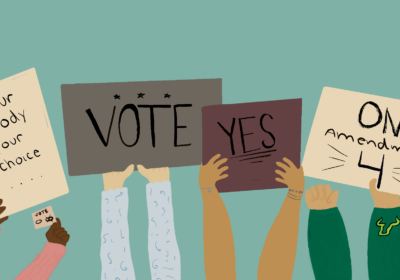Gun control debate does not belong in tragedy
On Saturday morning, Kansas City Chiefs linebacker Jovan Belcher, 25, fatally shot his girlfriend, Kasandra Perkins, 22, in front of his mother before driving to Arrowhead Stadium to take his own life. As the murder-suicide gained national media attention, the inevitable push toward gun control rhetoric emerged, as is true for any gun-related crime.
As the specifics of gun laws will likely always be in contention, the more important aspect the emotional and psychological state of the person who commits gun crimes should garner a lot more attention both before and after these of tragedies occur.
During his halftime segment on Sunday Night Football, NBC broadcaster Bob Costas quoted a piece from Fox Sports columnist Jason Whitlock, who wrote, In the coming days, Jovan Belchers actions and their possible connection to football will be analyzed. Who knows? But here, wrote Whitlock, is what I believe. If Jovan Belcher didnt possess a gun, he and Kasandra Perkins would both be alive today.
Costas received criticism for his report on social media from Second Amendment supporters who thought his comments were misinformed and that he should not have used the broadcast medium to express his opinions. But the point that both Whitlock and Costas tried to make should not be the main concern regarding this or other crimes like it.
The statements only serve to polarize the climate in the aftermath of tragedy and detract from the legitimacy of the arguments.
The problem in solving the gun violence dilemma is that both sides of the argument have inherently valid points. Guns are just objects, paper weights if you will, that only result in devastation when the user has the psychological determination to aim and pull the trigger.
However, guns serve only one purpose: to shoot a projectile with a potentially dangerous force. Whether individuals use this power to cause harm or prevent it is based solely on the emotional and psychological stability of the user.
Whenever tragedies like the one in Kansas City occur, it is far too easy to shift the blame to the availability of guns, getting us so caught up in that debate that we forget about the underlining cause. We did the same thing when news broke regarding the Aurora, Colorado shooter James Holmes and even more so after the Columbine High shooting in 1999. In both instances the gunmans emotional stability was questioned but the continual rhetoric afterwards concerned how to stop gun violence rather than how we, as a culture, could alleviate the emotional volatility of the perpetrator.
It will never be easy to delve into the mind of someone who could take another human beings life. It is almost easier to forego the uneasiness and push the blame onto something else. But before we rush to blame a piece of machinery we need to fully understand the most powerful weapon that humans can wield the mind.






